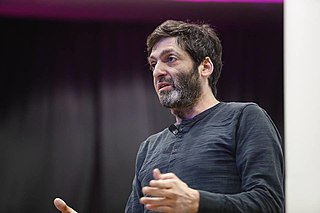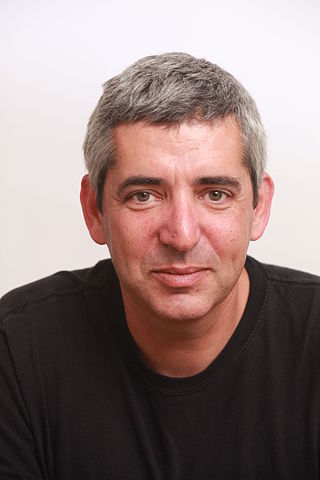
Telepathy is the purported vicarious transmission of information from one person's mind to another's without using any known human sensory channels or physical interaction. The term was first coined in 1882 by the classical scholar Frederic W. H. Myers, a founder of the Society for Psychical Research (SPR), and has remained more popular than the earlier expression thought-transference.
Confirmation bias is the tendency to search for, interpret, favor, and recall information in a way that confirms or supports one's prior beliefs or values. People display this bias when they select information that supports their views, ignoring contrary information, or when they interpret ambiguous evidence as supporting their existing attitudes. The effect is strongest for desired outcomes, for emotionally charged issues, and for deeply entrenched beliefs. Confirmation bias is insuperable for most people, but they can manage it, for example, by education and training in critical thinking skills.
In cognitive linguistics, conceptual metaphor, or cognitive metaphor, refers to the understanding of one idea, or conceptual domain, in terms of another. An example of this is the understanding of quantity in terms of directionality or the understanding of time in terms of money.
Deception is an act or statement that misleads, hides the truth, or promotes a belief, concept, or idea that is not true. This occurs when a deceiver uses information against a person to make them believe an idea is true. Deception can be used with both verbal and nonverbal messages. The person creating the deception knows it to be false while the receiver of the message has a tendency to believe it. It is often done for personal gain or advantage. Deception can involve dissimulation, propaganda and sleight of hand as well as distraction, camouflage or concealment. There is also self-deception, as in bad faith. It can also be called, with varying subjective implications, beguilement, deceit, bluff, mystification, ruse, or subterfuge.
Electronic assessment, also known as digital assessment, e-assessment, online assessment or computer-based assessment, is the use of information technology in assessment such as educational assessment, health assessment, psychiatric assessment, and psychological assessment. This covers a wide range of activities ranging from the use of a word processor for assignments to on-screen testing. Specific types of e-assessment include multiple choice, online/electronic submission, computerized adaptive testing such as the Frankfurt Adaptive Concentration Test, and computerized classification testing.

The Wason selection task is a logic puzzle devised by Peter Cathcart Wason in 1966. It is one of the most famous tasks in the study of deductive reasoning. An example of the puzzle is:
You are shown a set of four cards placed on a table, each of which has a number on one side and a color on the other. The visible faces of the cards show 3, 8, blue and red. Which card(s) must you turn over in order to test that if a card shows an even number on one face, then its opposite face is blue?
Academic dishonesty, academic misconduct, academic fraud and academic integrity are related concepts that refer to various actions on the part of students that go against the expected norms of a school, university or other learning institution. Definitions of academic misconduct are usually outlined in institutional policies. Therefore, academic dishonesty consists of many different categories of behaviour, as opposed to being a singular concept.
Dishonesty is acting without honesty. The term describes cheating, deficient probity, lying, deliberate withholding of information, being deliberately deceptive, or showing knavishness, perfidiousness, corruption, treachery, or deficient integrity.
In scientific inquiry and academic research, data fabrication is the intentional misrepresentation of research results. As with other forms of scientific misconduct, it is the intent to deceive that marks fabrication as unethical, and thus different from scientists deceiving themselves. There are many ways data can be fabricated. Experimental data can be fabricated by reporting experiments that were never conducted, and accurate data can be manipulated or misrepresented to suit a desired outcome. One of the biggest problems with this form of scientific fraud is that "university investigations into research misconduct are often inadequate, opaque and poorly conducted. They challenge the idea that institutions can police themselves on research integrity."
An essay mill is a business that allows customers to commission an original piece of writing on a particular topic so that they may commit academic fraud. Customers provide the company with specific information about the essay, including number of pages, general topic, and a time frame to work within. The customer is charged a certain amount per page. A similar concept is the essay bank, a company from which students can purchase prewritten but less expensive essays on various topics, at higher risk of being caught. Both forms of business are under varying legal restraints in some jurisdictions.
Lie detection is an assessment of a verbal statement with the goal to reveal a possible intentional deceit. Lie detection may refer to a cognitive process of detecting deception by evaluating message content as well as non-verbal cues. It also may refer to questioning techniques used along with technology that record physiological functions to ascertain truth and falsehood in response. The latter is commonly used by law enforcement in the United States, but rarely in other countries because it is based on pseudoscience.

Dan Ariely is an Israeli-American professor and author. He serves as a James B. Duke Professor of psychology and behavioral economics at Duke University. Ariely is the co-founder of several companies implementing insights from behavioral science. Ariely wrote an advice column called Ask Ariely in the WSJ from June 2012 until September 2022. Ariely is the author of the three New York Times best selling books Predictably Irrational, The Upside of Irrationality and The Honest Truth about Dishonesty. He co-produced the 2015 documentary (Dis)Honesty: The Truth About Lies.

"The Thin Line Between Chuck and Nate" is the 13th episode of the CW television series, Gossip Girl. The episode was written by Felicia D. Henderson and directed by Norman Buckley. It originally aired on Wednesday, January 9, 2008, on the CW.

Predictably Irrational: The Hidden Forces That Shape Our Decisions is a 2008 book by Dan Ariely, in which he challenges readers' assumptions about making decisions based on rational thought. Ariely explains, "My goal, by the end of this book, is to help you fundamentally rethink what makes you and the people around you tick. I hope to lead you there by presenting a wide range of scientific experiments, findings, and anecdotes that are in many cases quite amusing. Once you see how systematic certain mistakes are—how we repeat them again and again—I think you will begin to learn how to avoid some of them".

Why Did I Get Married Too? is a 2010 American comedy-drama film directed by Tyler Perry and starring Janet Jackson, Tyler Perry, Tasha Smith, Jill Scott, Louis Gossett Jr., Malik Yoba, Michael Jai White, Sharon Leal, Richard T. Jones, Lamman Rucker, and Cicely Tyson. Produced by Lionsgate and Tyler Perry Studios, it is the sequel to Why Did I Get Married? (2007). The film shares the interactions of four couples who undertake a week-long retreat to improve their relationships.

The Psychopath Test: A Journey Through the Madness Industry is a 2011 book written by British author Jon Ronson in which he explores the concept of psychopathy, along with the broader mental health "industry" including mental health professionals and the mass media. It spent the whole of 2012 on United Kingdom bestseller lists and ten weeks on The New York Times Best Seller list.

Uri Hezkia Gneezy is an Israeli-American behavioral economist, known for his work on incentives. He currently holds the Epstein/Atkinson Endowed Chair in Behavioral Economics at the University of California, San Diego's Rady School of Management. He is also a visiting research professor at the University of Amsterdam and NHH in Bergen.
Child lying refers to children displaying varying degrees of deceptive behavior in a social situation. Children have been observed lying as early as age 2 and their deceptive skills increase sharply as they mature into adolescence. Children who have advanced cognitive skills for their age have an increased tendency to begin lying at earlier ages. Children may lie for various reasons including, but not limited to, escaping punishment for not obeying a task, through observation of their parents and peers, or lacking a comprehensive understanding of basic morality.
Debiasing is the reduction of bias, particularly with respect to judgment and decision making. Biased judgment and decision making is that which systematically deviates from the prescriptions of objective standards such as facts, logic, and rational behavior or prescriptive norms. Biased judgment and decision making exists in consequential domains such as medicine, law, policy, and business, as well as in everyday life. Investors, for example, tend to hold onto falling stocks too long and sell rising stocks too quickly. Employers exhibit considerable discrimination in hiring and employment practices, and some parents continue to believe that vaccinations cause autism despite knowing that this link is based on falsified evidence. At an individual level, people who exhibit less decision bias have more intact social environments, reduced risk of alcohol and drug use, lower childhood delinquency rates, and superior planning and problem solving abilities.

(Dis)Honesty: The Truth About Lies is a 2015 feature-length documentary film directed by Yael Melamede. It explores the reasons why people lie and the methods they use. It features direct testimony, footage and the experimental research carried out by Dan Ariely.









